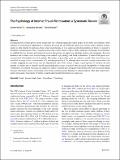The psychology of internet fraud victimisation : a systematic review
Date
09/2019Metadata
Show full item recordAbstract
Existing theories of fraud provide some insight into how criminals target and exploit people in the online environment; whilst reference to psychological explanations is common, the actual use of established behavioural theories and/or methods in these studies is often limited. In particular, there is less understanding of why certain people/demographics are likely to respond to fraudulent communications. This systematic review will provide a timely synthesis of the leading psychologically based literature to establish the key theories and empirical research that promise to impact on anti-fraud policies and campaigns. Relevant databases and websites were searched using terms related to psychology and fraud victimisation. A total of 44 papers were extracted and 34 included in the final analysis. The studies range in their scope and methods; overall, three main factors were identified: message (n = 6), experiential (n = 7), and dispositional (n = 21), although there was some overlap between these (for example, mapping message factors onto the dispositional traits of the victim). Despite a growing body of research, the total number of studies able to identify specific psychological processes associated with increased susceptibility to online fraud victimisation was limited. Messages are targeted to appeal to specific psychological vulnerabilities, the most successful linking message with human factors, for example, time-limited communications designed to enact peripheral rather than central information processing. Suggestions for future research and practical interventions are discussed.
Citation
Norris , G , Brookes , A & Dowell , D 2019 , ' The psychology of internet fraud victimisation : a systematic review ' , Journal of Police and Criminal Psychology , vol. 34 , no. 3 , pp. 231-245 . https://doi.org/10.1007/s11896-019-09334-5
Publication
Journal of Police and Criminal Psychology
Status
Peer reviewed
ISSN
0882-0783Type
Journal item
Collections
Items in the St Andrews Research Repository are protected by copyright, with all rights reserved, unless otherwise indicated.

